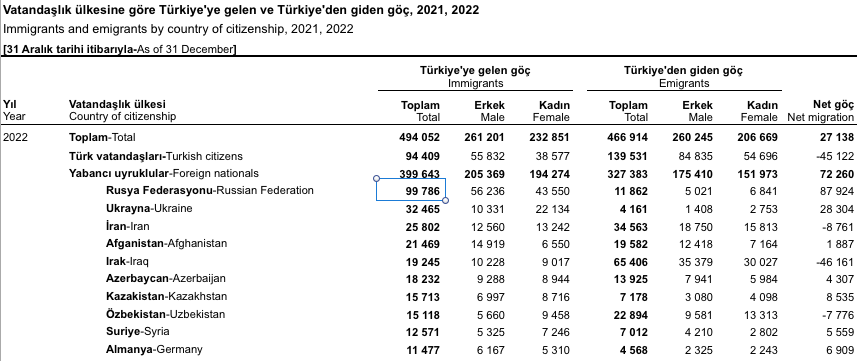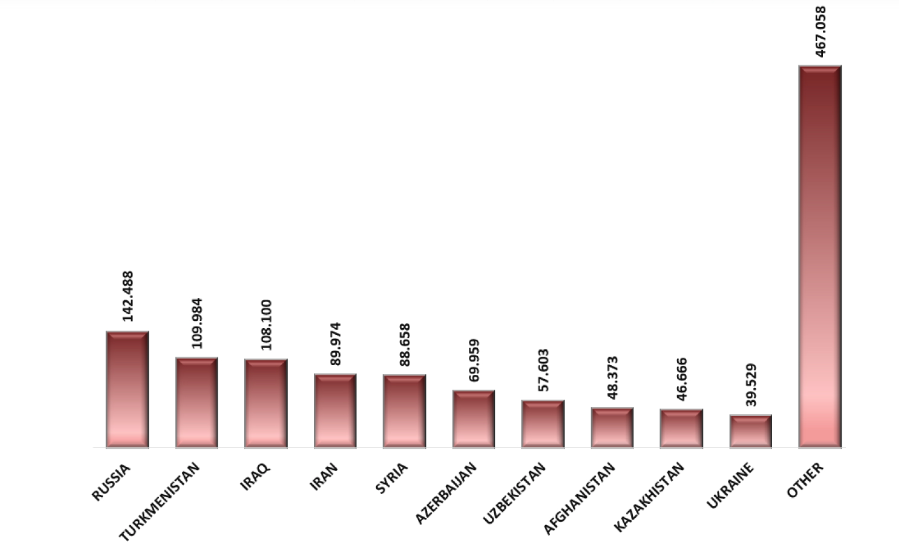Levent Kenez/Stockholm
Russia ranked first in the list of countries from which citizens moved to Turkey in 2022, according to official data released by the Turkish Statistical Institute (TUİK). More specifically, among people who migrated to Turkey last year, one out of every four was Russian. The official migration statistics do not include Syrian citizens under temporary protection status.
Following the Russian invasion of Ukraine on February 6, 2022, international sanctions imposed on Moscow and business figures in the West with alleged ties to the Kremlin led to a significant number of Russians moving to various countries. Among the emigrants were also opponents of the war and young men who wanted to avoid compulsory military service.
Among the most preferred countries for Russian emigrants were those with easy travel access and no visa requirements, including Turkey, Armenia, Georgia and the Central Asian Republics.
Turkey, one of the most favored destinations for those leaving Russia, experienced an unprecedented wave of Russian immigrants. Turkey’s policy of attempting to maintain a delicate balance during the Ukraine-Russia conflict and its decision not to join the sanctions imposed by the West played a significant role in its appeal to Russian migrants.

As a result, in 2022 Russian citizens took the top spot among immigrants who came to Turkey in 2022, with 99,786 citizens, comprising 25 percent of the total. Following Russia, Ukraine ranked second with 8.1 percent, Iran with 6.5 percent, Afghanistan with 5.4 percent and Iraq with 4.8 percent of newcomers in 2022.
In 2021 Russia had ranked sixth among countries with the highest emigration to Turkey, with 31,463 Individuals.
Russians also hold the highest number of residence permits. As of June 20, 2023 according to Turkey’s General Directorate of Migration Management, there are currently 141,488 Russian citizens residing in Turkey. Among them are students, individuals with families and short-term residence permit holders.
One of the main reasons for Russians choosing Turkey is the ease of capital transfer. For instance, with a last-minute amendment in August 2022, the application process for Turkey’s Wealth Amnesty Law, which expired on June 30, was extended until March 31, 2023. The law covers the import of foreign assets such as gold and foreign currency into Turkey through a bank or intermediary institution as well as the physical movement of currency notes. Beneficiaries do not pay taxes on the assets they report. There is also no citizenship requirement for benefiting from the Wealth Amnesty Law. Customs documents are sufficient for cash brought into Turkey. For this reason, it is estimated that Russians brought a significant amount of assets into Turkey, used primarily for real estate, business or gold purchases.

Furthermore, the trade volume between the two countries has reached its highest level in recent times. Foreign trade statistics since the beginning of the war, however, show that Turkey’s trade with Russia increased considerably in 2022. According to TUIK data, the trade volume with Russia, which was $34.73 billion in 2021, doubled to $68.19 billion in 2022, with imports from Russia accounting for a significant part of the increase.
Imports from Russia, which stood at $28.96 billion in 2021, rose to $58.85 billion in 2022. Russia has become Turkey’s largest trading partner, leaving China behind. Turkey’s share of Russia’s exports increased from 2 to 7 percent.
Nordic Monitor recently reported that during the January 1 to June 30, 2023 period, Turkey’s exports to Russia witnessed remarkable growth. Last year’s exports, valued at $2.6 billion, more than doubled this year, reaching $4.9 billion.
Despite a decline in imports, Russia has maintained its position as Turkey’s largest trading partner in terms of goods purchased. In the January to June 2023 period , Turkey imported a total of $27.7 billion in goods from Russia. Russia accounts for a significant share of Turkey’s total imports, representing 13.4 percent. Following Russia closely is China, with $20.84 billion and a 12.1 percent share.
The increasing trade relations between Russia and Turkey are causing concern for the United States and the European Union. There are suspicions that Russian companies and European firms looking to sell goods to Russia might be bypassing sanctions through Turkey. The US government on March 2 warned multinational companies to comply with sanctions imposed on Russia and Belarus, stating that otherwise the companies could be faced with criminal prosecution, administrative enforcement actions or additional designations. Several countries, including Turkey, are accused of facilitating the entry of products that are prohibited from being exported to Russia.












